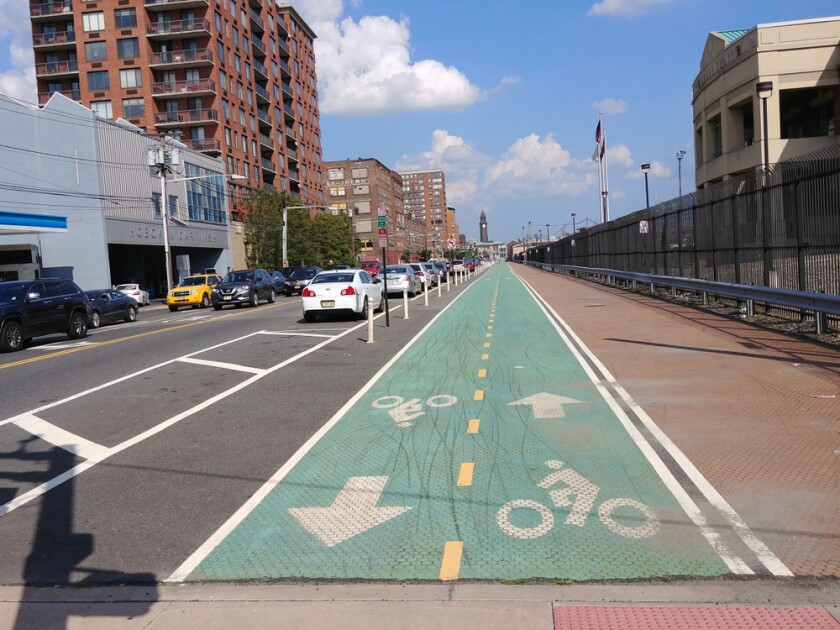In Brief:
Applications are open and money is flowing to cities looking to build safer streets for motorists, bikers, and pedestrians. The U.S. Department of Transportation announced the latest round of grants from the Safe Streets and Roads for All (SS4A) program this month. Grants were awarded to 99 different jurisdictions to fund planning studies and demonstration projects aimed at eliminating danger on the roadways.
The program was created as part of the 2021 Infrastructure Investment and Jobs Act — a $5 billion investment over five years. To date, more than 1,000 communities, containing nearly three-quarters of the U.S. population, have received SS4A grants. Two more rounds of awards are expected this year, in August and November, by which point more than half of the program’s funding will have been distributed.
This year’s grants “come at a key moment for road safety in America,” DOT wrote in a press release. “While road fatalities have decreased over the past seven quarters, approximately 40,000 people die on U.S. roads each year and a growing share of those lives lost are outside of motor vehicle[s], such as by bicyclists.” According to the Governors Highway Safety Association, more than 7,500 pedestrians died on the roads in 2022, the highest number in more than 40 years.
“Bicyclists, pedestrians, and drivers should be safe on our roads and streets, and the Biden-Harris administration is taking action across the country to make our roads safer for everyone who uses them,” Transportation Secretary Pete Buttigieg said in the release.
Projects Require Planning and Political Support
Implementation grants, which tend to carry much bigger dollar amounts, require lots of local community engagement and political support. That’s always been a challenge for local transportation planners. And in some places, street design is becoming more politicized.
One of the biggest awards in the latest round was a $4 million grant to Boca Raton, Fla., for planning and demonstration projects related to its Vision Zero program. Vision Zero is a campaign to eliminate traffic deaths and serious injuries that has been adopted by cities all over the globe. It incorporates a range of strategies related to roadway design that can reduce conflicts between drivers and other road users. The city says on its website that the grant will “aid in designing, developing, and implementing safety solutions over the next three years.”
To the extent that the city hopes to improve safety by removing or narrowing vehicular lanes — which advocates say is among the most effective strategies for making safer streets — they may face new challenges. A Florida law taking effect in July will add more hurdles to the process of repurposing traffic lanes, mandating that local governments notify all nearby property owners when they’re planning to redesign a road, produce a traffic study to anticipate the impacts and hold public meetings.
Most local governments do most of those things in the course of street safety projects anyway, but the state law is meant partly to prevent, in the words of Florida GOP Gov. Ron DeSantis, “agenda-driven” decisions by local governments.
Texas has taken a strong stance against certain types of safety projects as well, all but refusing to allow any vehicular lane on any state road to be repurposed. Houston’s new mayor, John Whitmire, has stopped or reversed work on a range of street safety projects that he says were designed by “anti-car activists” who worked for the previous mayor.
Applications Open Through August
Still, transportation safety advocates say the SS4A program is a rare and welcome investment from the federal government in local roadway projects. DOT says it has worked to award more than half of the grants to communities with historically underserved populations. And it tries to help small communities that have low staff capacity for writing grant applications get through the process. The department has reached out to communities with missing elements to help them complete their applications and sought to provide detailed explanations for why some communities’ applications have been rejected.
Some communities that might benefit from SS4A grants haven’t made it to the application process at all. The Local Infrastructure Hub, an initiative run by the National League of Cities and Bloomberg Philanthropies, hosts a series of “boot camps” to help cities navigate a range of grant programs funded through the 2021 infrastructure law. The boot camps have helped tiny cities apply for grants for projects as basic as installing stop signs.
On the other end of the spectrum, cities have won grants as large as $25 million to implement safety upgrades on long stretches of urban roadways.
Related Articles













